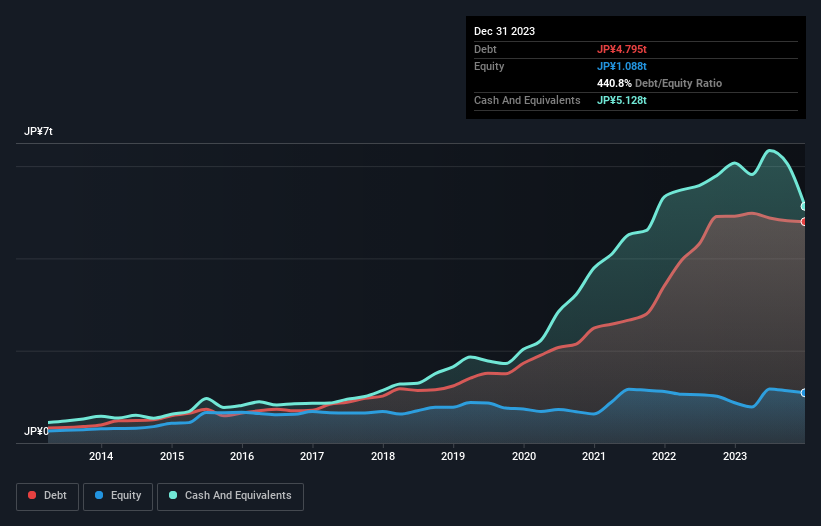Is Rakuten Group (TSE:4755) Using Debt Sensibly?
David Iben put it well when he said, 'Volatility is not a risk we care about. What we care about is avoiding the permanent loss of capital.' It's only natural to consider a company's balance sheet when you examine how risky it is, since debt is often involved when a business collapses. We can see that Rakuten Group, Inc. (TSE:4755) does use debt in its business. But is this debt a concern to shareholders?
When Is Debt A Problem?
Debt is a tool to help businesses grow, but if a business is incapable of paying off its lenders, then it exists at their mercy. In the worst case scenario, a company can go bankrupt if it cannot pay its creditors. While that is not too common, we often do see indebted companies permanently diluting shareholders because lenders force them to raise capital at a distressed price. Of course, the upside of debt is that it often represents cheap capital, especially when it replaces dilution in a company with the ability to reinvest at high rates of return. When we think about a company's use of debt, we first look at cash and debt together.
Check out our latest analysis for Rakuten Group
What Is Rakuten Group's Net Debt?
The chart below, which you can click on for greater detail, shows that Rakuten Group had JP¥4.80t in debt in December 2023; about the same as the year before. But it also has JP¥5.13t in cash to offset that, meaning it has JP¥332.5b net cash.

How Healthy Is Rakuten Group's Balance Sheet?
The latest balance sheet data shows that Rakuten Group had liabilities of JP¥477.3b due within a year, and liabilities of JP¥21t falling due after that. Offsetting this, it had JP¥5.13t in cash and JP¥7.28t in receivables that were due within 12 months. So it has liabilities totalling JP¥9.13t more than its cash and near-term receivables, combined.
The deficiency here weighs heavily on the JP¥1.88t company itself, as if a child were struggling under the weight of an enormous back-pack full of books, his sports gear, and a trumpet. So we'd watch its balance sheet closely, without a doubt. After all, Rakuten Group would likely require a major re-capitalisation if it had to pay its creditors today. Given that Rakuten Group has more cash than debt, we're pretty confident it can handle its debt, despite the fact that it has a lot of liabilities in total. When analysing debt levels, the balance sheet is the obvious place to start. But ultimately the future profitability of the business will decide if Rakuten Group can strengthen its balance sheet over time. So if you're focused on the future you can check out this free report showing analyst profit forecasts.
In the last year Rakuten Group wasn't profitable at an EBIT level, but managed to grow its revenue by 7.4%, to JP¥2.1t. That rate of growth is a bit slow for our taste, but it takes all types to make a world.
So How Risky Is Rakuten Group?
Although Rakuten Group had an earnings before interest and tax (EBIT) loss over the last twelve months, it generated positive free cash flow of JP¥373b. So taking that on face value, and considering the net cash situation, we don't think that the stock is too risky in the near term. Given the lack of transparency around future revenue (and cashflow), we're nervous about this one, until it makes its first big sales. To us, it is a high risk play. There's no doubt that we learn most about debt from the balance sheet. But ultimately, every company can contain risks that exist outside of the balance sheet. For example - Rakuten Group has 2 warning signs we think you should be aware of.
At the end of the day, it's often better to focus on companies that are free from net debt. You can access our special list of such companies (all with a track record of profit growth). It's free.
New: AI Stock Screener & Alerts
Our new AI Stock Screener scans the market every day to uncover opportunities.
• Dividend Powerhouses (3%+ Yield)
• Undervalued Small Caps with Insider Buying
• High growth Tech and AI Companies
Or build your own from over 50 metrics.
Have feedback on this article? Concerned about the content? Get in touch with us directly. Alternatively, email editorial-team (at) simplywallst.com.
This article by Simply Wall St is general in nature. We provide commentary based on historical data and analyst forecasts only using an unbiased methodology and our articles are not intended to be financial advice. It does not constitute a recommendation to buy or sell any stock, and does not take account of your objectives, or your financial situation. We aim to bring you long-term focused analysis driven by fundamental data. Note that our analysis may not factor in the latest price-sensitive company announcements or qualitative material. Simply Wall St has no position in any stocks mentioned.
About TSE:4755
Rakuten Group
Provides services in e-commerce, fintech, digital content, and communications to various users in worldwide.
Reasonable growth potential with adequate balance sheet.
Similar Companies
Market Insights
Community Narratives



